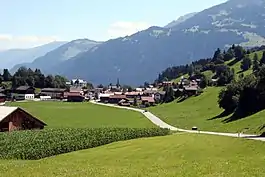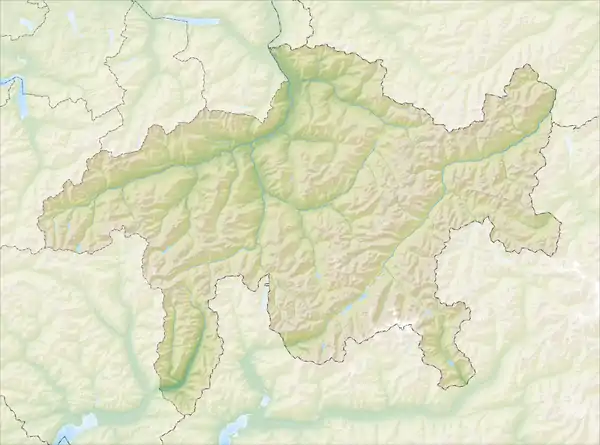Flond
Flond is a village in the municipality of Mundaun in the district of Surselva in the Swiss canton of Graubünden. In 2009 Flond merged with Surcuolm to form the municipality of Mundaun.[1]
Flond | |
|---|---|
 | |
 Coat of arms | |
Location of Flond 
| |
 Flond  Flond | |
| Coordinates: 46°46′N 9°9′E | |
| Country | Switzerland |
| Canton | Graubünden |
| District | Surselva |
| Government | |
| • Mayor | Peter Inauer |
| Area | |
| • Total | 2.12 km2 (0.82 sq mi) |
| Elevation | 1,072 m (3,517 ft) |
| Population (2006) | |
| • Total | 208 |
| • Density | 98/km2 (250/sq mi) |
| Time zone | UTC+01:00 (Central European Time) |
| • Summer (DST) | UTC+02:00 (Central European Summer Time) |
| Postal code(s) | 7137 |
| SFOS number | 3573 |
| Surrounded by | Ilanz, Luven, Obersaxen, Rueun, Surcuolm |
| Website | www |
History
Flond is first mentioned in 1519 as Flant or Flond.[2]
Geography


Flond has an area, as of 2006, of 2.1 km2 (0.81 sq mi). Of this area, 40.7% is used for agricultural purposes, while 51.7% is forested. The rest of the land, (7.7%) is settled.[3]
The village is located in the Ilanz sub-district of the Surselva district. It is on the Obersaxen high plateau south of the Vorderrhein river.
Demographics
Flond has a population (as of 2008) of 201, of which 7.5% are foreign nationals.[4] Over the last 10 years the population has grown at a rate of 20.3%.[3]
As of 2000, the gender distribution of the population was 55.1% male and 44.9% female.[5] The age distribution, as of 2000, in Flond is; 27 children or 15.1% of the population are between 0 and 9 years old and 25 teenagers or 14.0% are between 10 and 19. Of the adult population, 13 people or 7.3% of the population are between 20 and 29 years old. 34 people or 19.0% are between 30 and 39, 17 people or 9.5% are between 40 and 49, and 22 people or 12.3% are between 50 and 59. The senior population distribution is 17 people or 9.5% of the population are between 60 and 69 years old, 19 people or 10.6% are between 70 and 79, there are 5 people or 2.8% who are between 80 and 89.[4]
In the 2007 federal election the most popular party was the SVP which received 43.3% of the vote. The next three most popular parties were the SP (22.7%), the CVP (21.2%) and the FDP (12.9%).[3]
The entire Swiss population is generally well educated. In Flond about 76.2% of the population (between age 25-64) have completed either non-mandatory upper secondary education or additional higher education (either University or a Fachhochschule).[3]
Flond has an unemployment rate of 0.53%. As of 2005, there were 14 people employed in the primary economic sector and about 7 businesses involved in this sector. 16 people are employed in the secondary sector and there are 2 businesses in this sector. 7 people are employed in the tertiary sector, with 5 businesses in this sector.[3]
The historical population is given in the following table:[2][5]
| year | population |
|---|---|
| 1850 | 196 |
| 1900 | 193 |
| 1940 | 179 |
| 1950 | 162 |
| 1990 | 144 |
| 2000 | 179 |
Languages
Most of the population (as of 2000) speaks Romansh (50.8%), with German being second most common (46.9%) and Danish being third ( 1.7%).[3] In the 19th century, the municipality was still monolingual (1880: 96.4%). This preponderance of Romansch remained strong through the first half of the 20th century (1941: 90.5%), but it has slipped in the second half of the century.
| Languages in Flond | ||||||
| Language | 1980 Census | 1990 Census | 2000 Census | |||
| Number | Percentage | Number | Percentage | Number | Percentage | |
| German | 21 | 18.92% | 45 | 31.25% | 84 | 46.93% |
| Romansh | 88 | 79.28% | 78 | 54.17% | 91 | 50.84% |
| Italian | 0 | 0.00% | 0 | 0.00% | 0 | 0.00% |
| Population | 111 | 100% | 144 | 100% | 179 | 100% |
In 1990, there were also 12 persons (8.33%) that listed Portuguese as their native language.
References
- Amtliches Gemeindeverzeichnis der Schweiz published by the Swiss Federal Statistical Office (in German) accessed 23 September 2009
- Flond in German, French and Italian in the online Historical Dictionary of Switzerland.
- Swiss Federal Statistical Office Archived September 4, 2011, at the Wayback Machine accessed 09-Nov-2009
- Graubunden Population Statistics Archived August 27, 2009, at the Wayback Machine (in German) accessed 21 September 2009
- Graubunden in Numbers Archived September 24, 2009, at the Wayback Machine (in German) accessed 21 September 2009
| Wikimedia Commons has media related to Flond. |